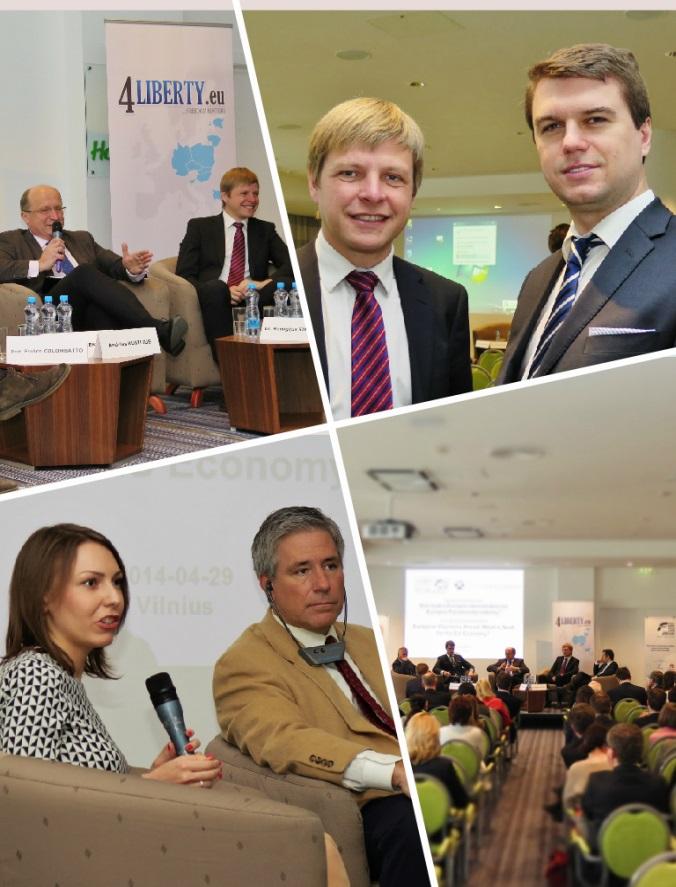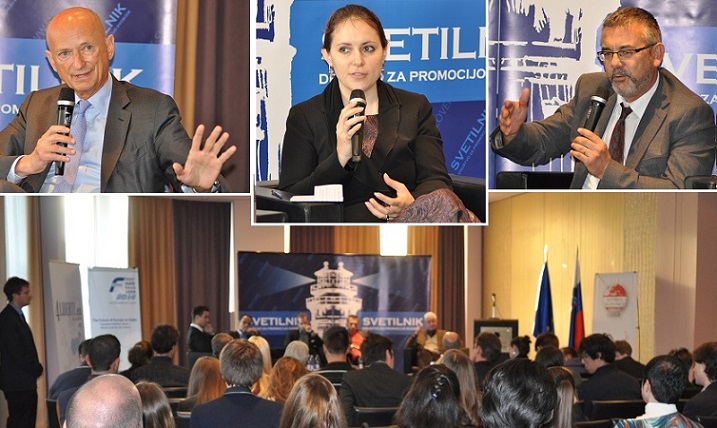At the end of April, 4Liberty.eu organized two stops of the Free Market Road Show: in Ljubljana, Slovenia and Vilnius, Lithuania. Both of the events gathered a high number of participants including members of parliament, high ranking government officials, representatives of foreign embassies, leading businessmen, scholars, opinion makers, public policy experts, students, and other interested parties from across Europe to discuss what kind of Europe we want.
The Slovenian think tank Svetilnik was proud to host the Slovenian stop of the 7th Free Market Road Show. The event was organized in cooperation with over 40 leading think tanks and universities across Europe and the Caucasus and in association with international partners such as the Austrian Economics Center, Liberty Fund, Friedrich Naumann Foundation for Freedom, FreedomWorks, European Students for Liberty, and the F.A. v. Hayek Institut.
During three panels, distinguished speakers expressed their views on centralization of EU financial sector regulation, exodus of the most talented and enterprising, and the rise of political extremism in the EU.
The first panel opened a question whether the EU central institutions should be granted further regulatory authority ostensibly to expand and flatten regulation. Many argue greater political integration – including a single EU authority in Brussels – is a step forward for the EU. Others argue for the principle of subsidiarity, ensuring that decisions are taken as closely as possible to the citizen affected by the regulation. Keynote speaker Draško Veselinovič (CEO and Professor, Gea College, Slovenia) took a stance for greater centralization of EU financial regulation. The panellist Pierre Garello (Professor, University Paul Cezanne Aix-Marseille, France), Andraž Grahek (Managing Partner, Capital Genetics, Slovenia) and Gordon Kerr (Consultant, Cobden Partners, UK) disagreed, arguing for smarter and more efficient EU financial regulation.
The second panel discussed whether Europe is witnessing an exodus of its brightest and most gifted. If brain-drain is a consequence of Europe’s failure to create an environment attractive to the best among us, could enhancing a business-friendly environment be a solution? The keynote speaker HSH Prince Michael of Liechtenstein (Founder, Geopolitical Information Service AG) argued that we are not losing only those that physically leave the country, but also those that have become disinterested in pursuing their ideas, plans, and dreams while still living in their home country. Žiga Turk (Former Minister of Education, Science, Culture and Sport, Slovenia) discussed the perils of government’s unwillingness to allow competition in the education system. Tanja Štumberger Porčnik (President, Svetilnik, Slovenia) discussed the negative attitudes towards those that would like to return into their home country, after spending some time abroad. All three panellist view the direction the welfare state is going and excessive government spending as causes of the worsening business environment and well as the lack of opportunities for the youth.
The third panel discussed the rise of political extremism in Europe and tried to answer whether demagogues and agitators are going to be the big winners in the upcoming EU elections. The keynote speaker Erich Weede (Professor, University of Bonn, Germany) took a stance that the real extremists whom we should fear are the Merkels and the Hollandes. The panellists Damir Črnčec (Professor, Graduate School of Government and European Studies, Slovenia) Anže Logar (EU Parliament Candidate, Slovenia), and Matevž Kadak (President, Student Association of Defense Studies, Slovenia) do not see political extremists as big winners of the upcoming EU elections.
In Vilnius, the Lithuanian Free Market Institute (LFMI) was in charge of the event. Just like in Ljubljana, the conference comprised three panels, focusing on centralization of EU financial sector regulation, tax policies and tax competition, and the future of Europe after the European Parliament elections. The keynote speakers for these three panels were renowned Polish economist, former governor of the Central Bank of Poland and president of the Polish Civil Development Forum prof. Leszek Balcerowicz, Senior Fellow of the U.S. Cato Institute Daniel Mitchell and Prof. Enrico COLOMBATTO, Professor of Economics at the University of Turin and director of the International Centre for Economic Research in Italy. The panellists included prominent members of the Lithuanian Parliament and party leaders, high ranking government officials, well-known economists and people from academia.
Prof. Leszek Balcerowicz began by addressing the inherent dangers of excessively concentrated political power. He related the topic to the following question: ‘Do we want a more centralized financial regulation of the EU?’ Prof. Balcerowicz argued that serious problems in Europe were more likely to stem from poor financial and political policies in individual European governments, and not from the EU itself. Nevertheless, he emphasized a number of steps that were necessary to prevent future financial crises in Europe. His presentation was followed by a lively discussion addressing concerns about the risks of Lithuania joining the European Banking Union.
Mr. Daniel Mitchell of the Cato Institute addressed the topic of tax competition and spoke of the intrinsic nature of people and money to move where business conditions are most favourable. He highlighted the exodus of intellectuals and entrepreneurs from France to United Kingdom, a phenomenon which has become known as ‘brain drain.’ Mr. Mitchell stressed that Lithuania needs to reduce the burden on income generation, namely labour tax, and attract and incentivise investment. The subsequent discussion raised concerns about the changing demographics world-wide with falling birth-rate falls and noted differences in taxation policy between countries such as Germany, Denmark and Singapore.
Addressing the third and final topic of the conference on the future of Europe after the European Parliament elections, prof. Enrico Colombatto began by examining the mediocre reception of the upcoming elections. Only 50 to 60 per cent of the European electorate is expected to participate, and about 30 per cent of those identify themselves as euro-sceptics. He argued that the success or failure of the EU had less to do with Brussels, and rather the quality of individual government’s policies. Politicians – on all levels – need to be held accountable and under pressure. The discussion raised concerns about the imminent elections in Ukraine and concluded with some candid observations of preferred leadership styles between the panellists.
Both events were covered by diverse media outlets and news portals. The speakers and panellists gave a number of interviews to local media.



















393 Comments
Hi there to all, as I am actually keen of reading this web site’s post to be updated regularly.
It carries nice stuff.